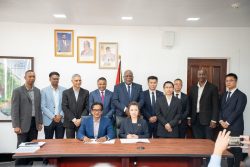The Pan American Health Organization (PAHO) is doing great things in Latin America, but I wonder whether its latest role as a middleman to help place 4,000 Cuban doctors in remote areas of Brazil does not amount to sponsoring slavery.
Under a deal between Brazil and Cuba that was brokered by the Washington-based PAHO, the Latin American branch of the UN World Health Organization, the Brazilian government will pay Cuba the equivalent of US$4,080 a month — or nearly US$49,000 a year — for each of the Cuban doctors.
The Brazilian government says the Cuban doctors are needed in remote areas of northern and northwestern Brazil, because no Brazilian physicians want to take those jobs. The first 400 Cuban doctors started arriving in the South American country on Aug 24 amid public criticism from Brazil’s biggest physicians’ associations.
 Brazil’s National Federation of Brazilian Physicians, Fenam, has said that “the Cuban doctors contracts have the characteristics of slave labour.”
Brazil’s National Federation of Brazilian Physicians, Fenam, has said that “the Cuban doctors contracts have the characteristics of slave labour.”
Under the PAHO-brokered Brazilian programme, called Mais Medicos (More doctors), Brazil pays Cuba the entire amount of the Cuban doctors’ wages, and Cuba later pays a fraction of it to the doctors.
Here’s the problem: Neither Brazil, nor Cuba, nor PAHO are saying how much of the $4,080 a month per doctor will go to the doctors working in Brazil.
Solidarity without Borders, a Miami-based organization that helps Cuban doctors around the world, says the Cuban government pays its doctors working in Brazil and other countries between $250 and $300 a month, or about 7 per cent of the full amount it gets from the Brazilian government. The remaining 93 per cent is pocketed by the Cuban government, the group says.
“It’s a modern-day slavery system,” Solidarity Without Borders President Julio Cesar Alfonso told me in an interview. “The only difference is that it uses highly skilled slave work.”
Asked how he knows the amount paid by Cuba to its doctors in Brazil, since it’s an official secret, Alfonso responded, “It’s very simple: there are about 30,000 Cuban doctors in Venezuela, and other tens of thousands around the world, and more than 5,000 have already defected. They tell us how much they were being paid by the Cuban government.”
Former Cuban ruler Fidel Castro created this doctors-for-export racket in 1982 as a way to earn cash for the country. Castro opened medical schools throughout Cuba to produce as many doctors as fast as possible. As Cuba’s economic situation deteriorated over the years, Cuba stepped up its doctors’ export business, Alfonso says.
Some of the Cuban doctors that are being sent abroad have not even graduated, Alfonso said.
“They are now exporting 5th and 6th-year medicine students to Venezuela, as part of their training to get their degree,” he said. Cuban doctors who are sent to Brazil, Venezuela and other countries don’t complain about their pay: the $250-$300 a month that they can make in Brazil is nearly ten times more than the average of $30 a month that they make in Cuba. In addition, it gives them a chance to defect, Alfonso says.
“It’s a good business deal for Cuba, and it also serves as a way to export Cuba’s ideology to the poorest parts of the world,” Alfonso says, adding that Cuban doctors played a big role in helping late Venezuelan President Hugo Chávez win support in poverty-stricken parts of Venezuela. “In remote jungle regions where they never saw a doctor, the presence of a fifth-year Cuban medicine student is a godsend.”
When I called PAHO to ask how much the Cuban doctors in Brazil will be paid by Cuba, I was told that PAHO’s director, Carissa E Etienne, was not available but that PAHO’s Brazil office would respond via e-mail.
A few hours later, I got PAHO’s non-answer. It said that that “the Cuban doctors are Cuban government officials,” and that they will be paid their normal wages with “an additional salary” by the Cuban government “according to the laws of that country.”
As for the Brazilian doctors’ federation assertion that the deal amounts to “slave labour,” PAHO’s response was that, “This question has been examined by various departments of the Brazilian government and the country’s authorities do not agree with that assertion.”
My opinion: There is nothing wrong with Brazil hiring Cuban doctors who are willing to go to remote areas of the country, where Brazilian doctors allegedly refuse to go.
But the Brazil-Cuba deal whereby the Cuban government reportedly pockets 93 per cent commission on the Cuban doctors’ salaries is scandalous.
And for an affiliate of the United Nations — an organization whose charter calls for the abolition of all sorts of slavery, and that celebrated the UN International Day for the Remembrance of the Slave Trade just last week — is even more outrageous.
Cuban doctors should be allowed to work in Brazil, but they should be paid their full salary. Otherwise, it’s hard to see the ongoing deal — and the fact that all three sides are not disclosing how much the Cuban doctors in Brazil will be paid — as anything other than a modern day high-skilled slave trade.
© The Miami Herald, 2013. Distributed by Knight Ridder/Tribune Media Services.









